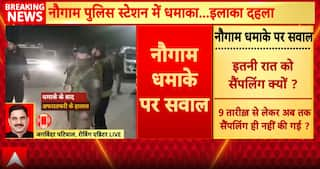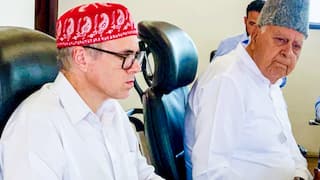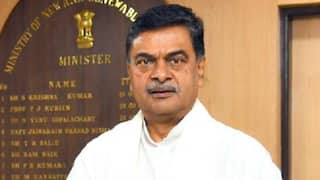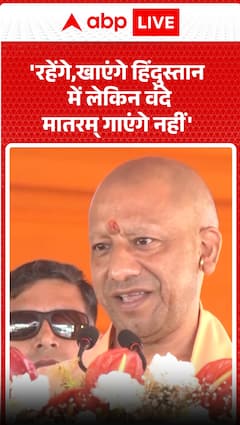(Source: ECI | ABP NEWS)
How India Pursued Covid-19 Vaccine Diplomacy Amid Vaccine Nationalism By Rich Nations
India supplied 23.9 crore free vaccine doses to 101 countries worldwide and UN entities during the peak of the pandemic, simultaneously vaccinating its own people.

The last 30 months have seen the world getting ravaged by Covid-19. India suffered too, but we handled the pandemic much better than many powerful countries around the globe, which has been acknowledged and praised by the world. It’s something we should be proud of. Not only that, India helped several other countries too and is still doing it through Vaccine Maitri. In 75 years since Independence, and especially during the Covid-19 pandemic, India has shown a great stride, marching from beggary to being a donor, by turning adversaries into opportunities.
No one can ignore the role of India globally, that even before the Covid-19 pandemic hit us, India’s generic medicine and vaccine manufacturing capacity was a major cog in the wheel of global health security. Over 92% of people living with HIV worldwide were taking lifesaving antiretroviral medicines that were produced by Indian generic pharmaceutical manufacturers. Same was true for hundreds of other life-saving medicines and vaccines. Over 80% of vaccine doses consumed globally for prevention of life-threatening infectious diseases have been manufactured in and supplied by India. The Serum Institute of India (SII), for example, was well acknowledged as the world’s biggest vaccine manufacturer, and recently Johns Hopkins Bloomberg School of Public Health awarded the Dean’s Medal to SII chief Cyrus Poonawalla, in recognition of its contribution of measles vaccines between 1990 and 2016 that helped save 22 million lives globally.
India helped other nations scale up access to medicines for treatment of HIV, tuberculosis and other infectious diseases as well as hundreds of other medicines, while it was doing the same within its own borders. Look at an example of HIV treatment. Today, not only around 15 lakh people living with HIV (PLHIV) in India are receiving lifelong free supply of these medicines, but every 9 out of 10 persons with HIV worldwide are also taking these medicines made in India and staying healthy.
Despite the public health emergency imposed by the pandemic and the ensuing humanitarian crisis, India’s pharmaceuticals and vaccine makers have ably held the fort, notwithstanding the long-drawn criticism from rich nations, often being labelled as copy-cats by the powerful multinational pharma lobby. When rich nations of the Global North were stockpiling and hoarding Covid-19 vaccines, many times more than their population, India not only spearheaded one of the largest vaccine drives within the country but also shared the vaccine doses with low- and middle-income countries (LMICs) worldwide.
India supplied 23.9 crore free vaccine doses to 101 countries worldwide and UN entities during the peak of the pandemic, simultaneously vaccinating its own people. This was in addition to vaccines supplied by Indian companies globally at affordable costs. It is perfectly in consonance with the Hindi maxim, “Ghayal ki gati ghayal jane, aur na jaane koi (only a wounded person can understand the pain of other wounded people)”. Indian vaccines were also supplied to South Asian neighbouring countries at a time when the rich nations sat on huge stocks of vaccines, undeterred by sharp criticism, and later ended up dumping the vaccines upon expiry. Is it not a crime against humanity that millions of vaccine doses were thrown upon expiry even after their third and fourth doses were administered to their people, but could not be given to those who did not even have primary doses? The euphemism was once again reinforced that their lives are more precious than those in LMICs. Look at Canada’s population, which is 3.6 crore, but last month there was news that it had destroyed 1.36 crore Covid-19 vaccine doses, but did not oblige countries in central and south America where vaccination rates are far lower than in the US and Canada.
Vaccine Nationalism By Rich Nations
Science had been clear since the early days of the Covid-19 pandemic that the only possible way out of the pandemic could be by ensuring that full vaccination is ensured for every eligible human being on the planet in a time-bound manner so that severe Covid disease, hospitalisations, ICU admissions, being on ventilators and untimely deaths are prevented.
Rich nations have vaccinated their eligible populations many times – from three to five times — whereas there are several low-income nations that are yet to reach the target of 40% fully vaccinated people (a target which rich nations had crossed within a month of beginning of their vaccination). Ironically, the people in rich nations have been vaccinated against Covid-19 ten times faster than those in low-income nations.
The stark vaccine inequity is evident from the unequal distribution. In a world with over 7 billion people, 12 billion vaccine doses have been administered – around 152 shots for every 100 people worldwide. By May 2022, almost 18 months since the first COVID-19 vaccine was administered, 68 countries had still not achieved 40 percent coverage. Only 16% of the people in low-income countries have received at least one dose. Globally, on an average, about three-quarters of the health workers and people aged over 60 have been vaccinated, but these rates were much lower in low-income countries.
People in low and middle-income countries not only got fewer vaccine doses and/or got them very late (if at all), but also at times vaccines reached their countries close to the expiry date. For example, the British Medical Journal (BMJ) reported recently that by the end of 2021, Nigeria had agreed to receive 2.6 million doses of Covid-19 vaccines from WHO’s Covax facility (an United Nations-WHO initiative set up for equitable distribution of vaccines globally). But these vaccines — most of which came from Europe — were close to their expiry date. Nigeria could administer 1.53 million doses on time, while the rest (1.07 million doses) were thrown away. “Nigeria, Rwanda, Kenya, and Indonesia have destroyed vaccines received from Europe and North America because they arrived close to expiry," reported BMJ.
We saw it clearly in 2021 that countries (like Israel), which were way ahead in vaccinating their populations fully, were showing very low hospitalisation and ICU admissions among those infected with the virus. Yet, we failed to scale up vaccination equitably. As a result, when the Omicron variant of the coronavirus hit us, the pandemic primarily became a ‘pandemic of the unvaccinated’. More than 90% of those needed hospitalisation, ICU or ventilator or died, were unvaccinated. Who is responsible for this avoidable human suffering and pain, and untimely deaths? And think of the scenario without India in it!
Dr Ishwar Gilada is HIV and Infectious Diseases physician, president of AIDS Society of India, Governing Council member of International AIDS Society-IAS and Secretary General of Organised Medicine Academic Guild-OMAG
[Disclaimer: The opinions, beliefs, and views expressed by the various authors and forum participants on this website are personal.]
Check out below Health Tools-
Calculate Your Body Mass Index ( BMI )







































